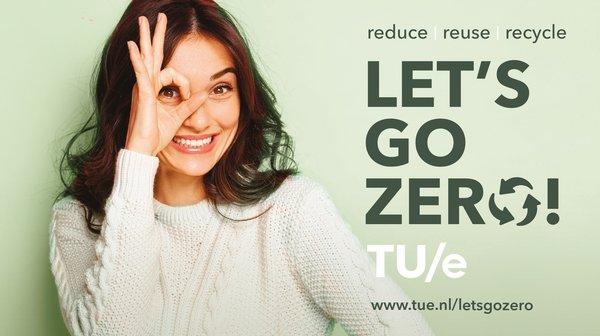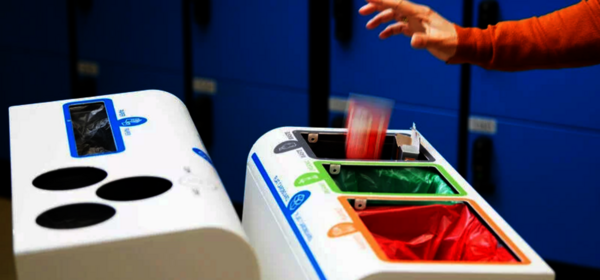
Creating Awareness in the TU/e community
TU/e strives to become a waste free university by 2030, and continuously seeks for opportunities to contribute to this goal. On a yearly basis new initiatives are implemented with the aim to steadily reduce the amount of waste we produce. We focus on decreasing the amount of residual waste since this type of waste has no circular use.
Separate collection of waste in the TU/e buildings
The TU/e has chosen for a new method of waste collection on the shop floor. When residual waste streams are separated better, this results in streams that can be reused or recycled. In this way, waste can often be turned into a raw material again. Each kilogram of waste that does not need to be incinerated as residual waste yields a saving of 840 grams of CO2 emissions.
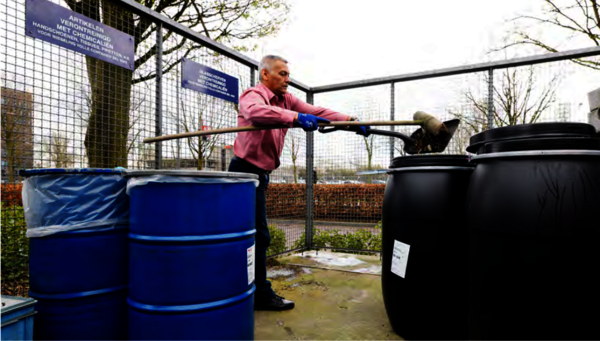
Waste
The TU/e Intake Chemical Waste – consisting of the Chemical Distribution Center building and the Recycling Center – takes care of the discharge of all chemical waste of TU/e.
Hazardous & Non-hazardous waste
Hazardous waste is transported every day from the depots at the buildings to the Chemical Distribution Center. At the Recycling Center industrial waste streams such as wood, glass, paper, scrap, rubble and residual waste are sorted out and discharged to the waste collector. Office waste, already separated, is collected by the external cleaning contractor and deposited into the designated containers. In addition, the caterer separates the waste emerging from the preparation kitchens, including the streams of cooking oil and swill waste (cooked kitchen waste and left-overs).
Tulips
Central, clearly visible and easily accessible collection points several buildings, the so-called Tulips (one Tulip for every 25 workplaces), replace the waste and paper bins from the offices. See the table of waste streams in the Tulip.
Check out the overview waste 2017-2022.
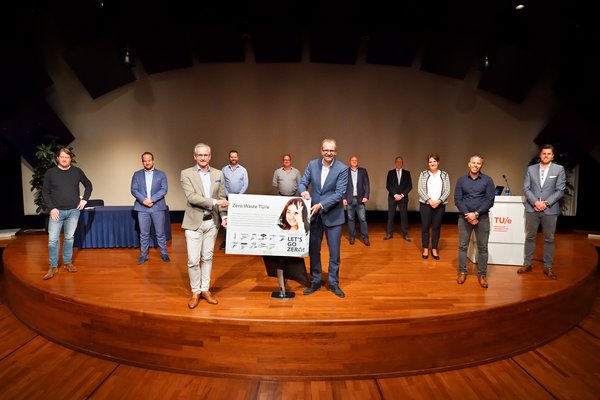
Chain Coop
To become a waste-free university, we need the help of employees, students and suppliers. One of the projects resulting from the ‘Let’s go zero’ campaign is to start up a chain cooperation. In order to prevent, reuse or recycle waste as much as possible, it is important to study the entire chain (from design to processing). Since its initiation in 2021, the first improvements that have been made as a result of the chain cooperation are as follows:
- Asito is reducing PMD waste by using bottles made from recycled material and making it possible to refill bottles. This has led to a reduction of 120 kg of plastic a year.
- Vermaat has adapted their menu and banqueting folder to make room for residual processing, among other things by offering daily menus.
- Appèl has joined the 'Too good to go' app, which prevents food waste and waste.
- With the help of Renewi, the plastic stream was replaced by the PMD stream.
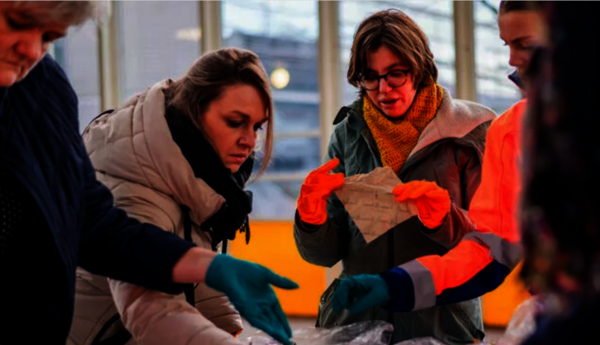
Residual Waste Analysis
The current target is to reduce residual waste to 30% in 2023, setting a trend that will continue until TU/e can consider itself 'waste-free' in 2030. You can find the waste roadmap for 2020-2024 (in Dutch) here. To reach a waste free university, all participants’ involvement is needed. In 2023, the TU/e initiated a residual waste resource analysis, covering all TU/e buildings. Every building was visited and during this visit, a 1100-liter roll-off container with residual waste was searched through and analysed, leading to a full and detailed overview of methods and actions to further improve our waste separation and re-use potential. First analyses show, that some 57% of the content of the residual waste container is food waste and plastic. If disposed correctly in the currently available bins, it could easily be recycled.
You can read more about this here.
Measures to reduce waste (Let's go zero 2030!)
- All the buildings on campus have waste bins with various waste streams
- The cleaners collect waste separately in the cleaning carts and ensure that it is processed separately;
- Facility suppliers provide homogeneous packaging materials for proper waste separation;
- We look closely at the reuse, recycling and ultimate disposal of the furniture;
- In webshops we call attention to sustainable choices (think of reprographics or office supplies);
- Single-use plastics are no longer allowed;
- Since October 2021, the Atlas restaurant has joined the 'Too good to go' app to combat food waste and rubbish;
- The plastic waste stream has been replaced by the PMD stream.
- The Billie Cup replaced the disposable coffee cups on campus.
